Dave Brubeck
Le gentleman musical de la côte ouest
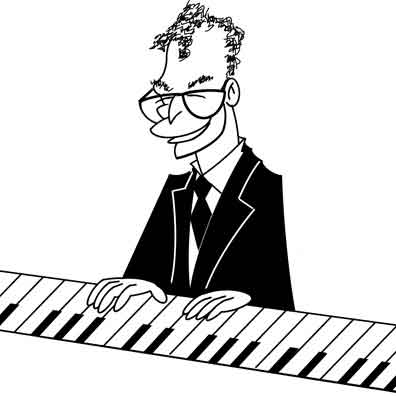
Dave Brubeck
He took five.
Yes, yes, we know that jazz pianist Dave Brubeck didn't actually write his hit tune "Take Five. This most iconic of iconic jazz pieces was written by Paul Desmond who played alto saxophone with Dave for many years. "Take Five" was featured on Dave's album Time Out which became - and remains - one of the best selling jazz albums of all time.
Dave is perhaps the most famous of the purveyors of what came to be called "West Coast Jazz". This is, we read (in some places), a sub-genre of "Cool Jazz", the invention of which has largely been credited to trumpet player Miles Davis. After all, with the release of Miles's album Birth of the Cool in 1957 that pretty much lets us know when Cool Jazz began.
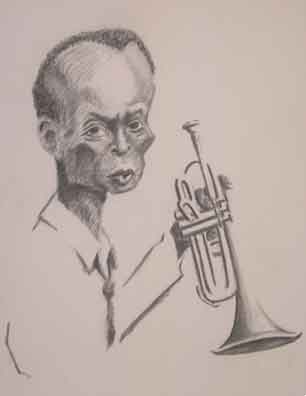
Miles Davis
Inventing the Cool
But no art form appears by fiat. Instead, as with other natural phenomenon, art emerges from a process of evolution. Also the words everyone uses to describe the art emerge gradually. Certainly the word "cool" to describe jazz goes back before Miles's milestone album.
So although it was two years after the release of Birth of the Cool that Dave's Album Time Out hit the record stores, Dave had already been cool. Dave even had his portrait featured on the cover of Time Magazine in 1954. Yes, that's nineteen fifty-FOUR. His first recordings were cut as early as 1946.
The phrase "cool jazz" was certainly in common use by 1953 when a character in the novel, The Hot and the Cool, muses about difficulties of labeling jazz with such a term. In 1955, LIFE Magazine mentioned saxophonist Lester Young playing in the genre.
So what is West Coast jazz and its supra-genre cool jazz? We'd really like to know that.
I thought you would, as Captain Mephisto said to Sidney Brand. But discriminating between the two isn't easy.
Well, according to one reference cool jazz is a "term applied to diverse styles of modern jazz variously perceived as subdued, understated, or emotionally cool." Now when both words of a two-word phrase are actually part of the definition you know you're in for a bit of vaguery.
In general, though, we can say that cool jazz tends to have moderate tempos, reduced dynamics, and extended legato phrasing. Not that the musicians don't play a lot of notes in short shrift. A recent review of a re-issue of Miles's album points out that to the newcomer to jazz, cool jazz sometimes sounds pretty hot. On the other hand you usually do not get screaming high notes either. All in all, cool jazz isn't a foot-stompin' clap-along type of music. Instead you sit back, relax, and philosophize.
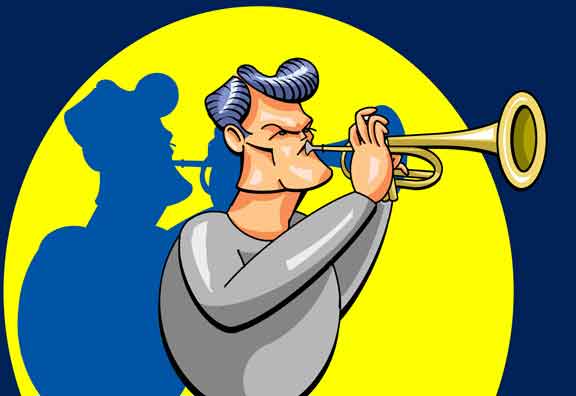
Chet Baker
Oklahoma Cool
As far as the West Coast stuff and what the heck that means, it is true that Dave and Paul were from California as were other cool purveyors like Art Decker and Chet Baker (Trumpet), although Chet was born in Oklahoma. Baritone sax player, Gerry Mulligan, was born in Queens, New York, and clarinetist and saxophonist Jimmy Giuffre hailed from Texas. Bob Brookmeyer, who played (valve) trombone on Jimmy's famous album Trav'lin' Light was from New Hampshire. At some point all these chaps have been said to have played West Coast jazz.
The consensus is that you cannot simply say that West Coast jazz is cool jazz that came from California. But getting a hard mathematically precise distinction isn't easy. One scholar stated that West Coast jazz refers to an approach in playing jazz rather than a style.
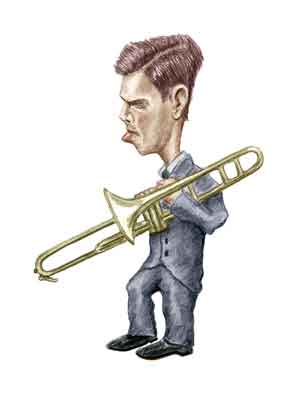
Bob Brookmeyer
New Hampshire Native
A Personal CooperToons Opinion is that properly designed double-blind listening tests involving jazz experts will not distinguish West Coast and cool jazz with statistical significance. Instead the problem we have in trying to distinguish twixt the twain is due to a philosophical problem recognized by the great logician Ludwig Wittgenstein.
After many years of study in places as varied as Cambridge University and an Italian WWI POW camp, Ludwig decided that philosophers were in fact screwing everything up - an odd thing for a man to say who later became Professor of Philosophy at Cambridge. They keep asking for the overall true meaning of a word that applies to all usages of the word when there is no such thing.
The meaning of a word or phrase, Ludwig decided, was determined by the manner in the way the words are used. That is, the context itself defines the words.
So when you tell someone that you had a good time at the party or if you thought the ridiculously expensive paté de fois gras wasn't good at all ("Huh! It tasted like ground up goose liver") or you think that the Queen of England certainly does a lot of good for her country, it's the context that dictates what the word "good" means. With the context defining the word, there's no problem in understanding what it means.
But say such things to a philosopher, and he will sit back, gaze abstractly at the ceiling, and ask "But just what does 'good' mean?" "How do we know if anything is truly 'good'?" "What makes 'good' men turn to evil?"
But look what he's done! He's taken the word out of context and so stripped it of any meaning. And then he turns right around and asks what the lousy word means! Of course there is not - and cannot be - any real answer.
Therefore it's ridiculous to try to define something - like "West Coast jazz" or "cool jazz" in an abstract sense devoid of the specific players and their music. So when we say Dave Brubeck played West Coast jazz, then he did.
Dave was born in 1920 in, yes, Concord, California. His dad, Pete, wanted his son to follow the family calling and be a rancher. Dave was intending to do just that but his mom, Bessie who was a talented and serious musician, saw her son had the wherewithal to be a pianist and forbade him to do rough work that might injure his hands.
Still, Dave enrolled at the then College of the Pacific in Stockton, California (today's University of the Pacific) with the intent of being veterinarian. But his interest was in music and he switched majors.
After graduating, Dave was drafted into the army - there was, after all, a war on - and he served in George Patton's Third Army. But he was good enough of a musician to be assigned to play in a band to entertain the troops. Of course, when the fighting got intense - like on July 6, 1944 - Rifleman David Brubeck was shipped overseas. Then just before he left San Francisco he met a young saxophonist named Paul Breitenfeld who soon changed his name to Desmond.
In high school Dave had begun playing in jazz bands to pick up some spare change. This was still the time when dancing had to be to live music and dancing was one of the most popular get-out-and-have-a-good-time activities. So there was a real demand for performers. He continued playing while in college and the army and after the war decided to make music a career.
After the war Dave studied composition with composer Darius Milhaud at Mills College in Oakland. Although an all-girls school, after the war the college let some male veterans in. At Mills he met a number of musicians and they formed an octet, commonsensically called the Dave Brubeck Octet.
Their music was jazz but not typical jazz - the bebop of Dizzie Gillespie and Charlie Parker may have been the "in-thing" but it was not as widely popular with the public as some would later think it was. Dave's playing was laid back and relaxed - just what you'd want in a club where the lights were low and people wanted to take it easy. Like many a fledgling musician Dave and the others played anywhere they could get the work.
But to many his music seemed strange. Dave had begun experimenting with unusual polyphonic harmonies and odd time signatures. His group was once hired to play in a Chinese restaurant but the gig ended abruptly once the owner got a sample of the music. When Dave's dad heard the group perform, he told his son, "That's the [darndest] bunch of noise I ever heard." Fortunately, although the Octet itself could only land a few paying gigs, Dave - who was now married and had a couple of kids to support - was able to find steady work playing piano in other groups.
In 1947, Dave was playing for a group called the Three D's. The D's were Don Ratto, Darrell Cutler, and Dave Brubeck. But so as not to appear to monopolistic with the alphabet, their singer was a young lady named Frances Lynn.
But Don - who played stand-up bass - was hired away by another band and he took Frances with him. So the Three D's Plus Frances was suddenly left as a 2-D duet.
The new band that had sapped the Three D's just happened to be run by Dave's old friend, Paul Desmond. He said he'd hire Dave too. The trouble was Paul would pay only $42 a week not the $100 Dave had been receiving. But $42 a week was better than nothing and knowing Paul would be playing saxophone, Dave knew the music would be good. With some reluctance he said OK.
It wasn't just the drop in pay that made Dave wonder if he'd make it. He and Paul would drive thirty miles each night to reach the club. Paul would take the wheel and drive 90 miles an hour over the whole 45 mile an hour route. Dave said Paul broke every traffic law in the books and didn't even bother to stop at the traffic lights.
The job didn't last too long as Paul left for another club. Dave was again on his own and he became rather miffed at Paul since Paul wouldn't let the band continue under its name if he wasn't in charge. Fortunately Dave soon found work in Oakland at the invitation of Jimmy Lyons who later became an influential promoter of jazz music and its performers.
Jimmy also had a radio program on a local station and Dave and his band - reduced from an octet to a trio - began to get much welcome publicity. Dave even taught a jazz extension course at Berkeley although one faculty member went into spittle flinging diatribes when he learned that he would be in the same course catalog as a (ptui) jazz musician.
Jimmy's influence helped Dave land some recording sessions with Coronet Records, a small firm based in San Francisco. Coronet was soon acquired by Fantasy Records which found Dave's records surprisingly good sellers. So by 1950, Dave could be considered a successful jazz recording artist although it's not quite clear how much of the profits were ending up in his pockets.
Everyone knows the story of how Dave injured his neck in a swimming accident and was forced to switch from fancy melodies to playing percussive chords. But that was scarcely a musical handicap and in 1951 Dave formed his famous Dave Brubeck Quartet (and this time he hired Paul).
The Dave Brubeck Quartet became the long term house band at the Black Hawk Nightclub in San Francisco and they were soon packing in the college kids. This was, after all, the era of the beatniks and beatniks liked jazz. Rock and roll didn't exist (Elvis was only 16).
Dave continued to record. In 1953 he signed with Columbia Records - a big label where one of the executives was oboist and later televisions sing-along maestro Mitch Miller. It was a year later that Dave made the cover of Time.
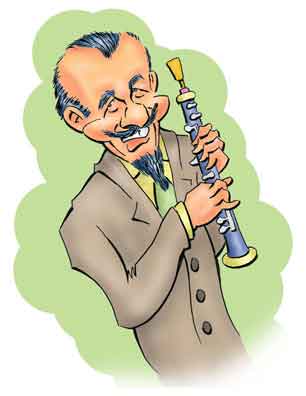
Mitch Miller
The Executive
Critics, though, didn't always know what to make of Dave's "modernist" music. Although they recognized it was innovative, not all were convinced of its artistry. Once after hearing Dave's rendering of Hoagy Carmichael's "Stardust", a listener asked, "If this is 'Stardust', why doesn't it sound like it?"
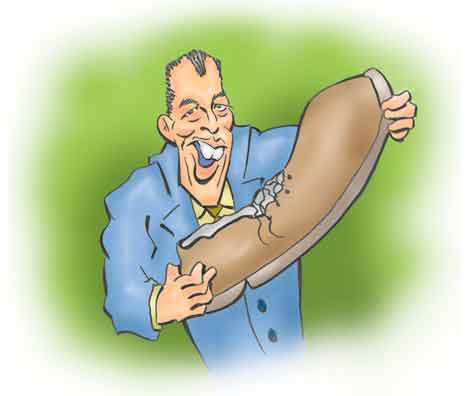
Ed Sullivan
#1
Now it is true that the 1959 album Time Out with Paul's composition "Take Five" solidified Dave into the mainstream American collective consciousness. But he had already reached the pinnacle of highest acclaim. No, we don't mean the Time Magazine cover. In 1955 he appeared on the Ed Sullivan Show - which with its Sunday night prime time slot was the #1 television program. Dave returned to Ed's show in 1962 after he had appeared only the week before on the Tonight Show then hosted by Jack Paar. This was a bold move since at the time Jack and Ed were not on good terms.
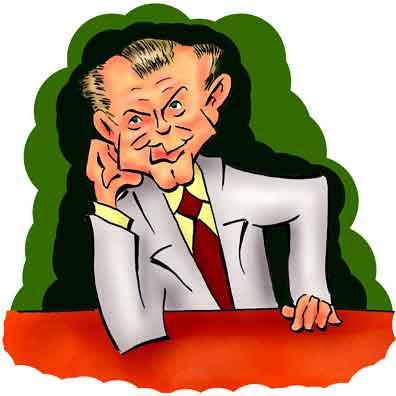
Jack Paar
Not on Good Terms with Ed
Starting in the 1960's Dave toured the world, either with the Quartet (which by necessity had to change personnel) or solo. He played in massive concert halls, in cozy clubs, and even in church sanctuaries - wherever they could set up a piano. He kept playing into his nineties with his last performance in 2011 and died the following year. And of course he had kept recording; a quick count gives over 100 albums. That's pretty cool.
References and Further Reading
It's About Time: The Dave Brubeck Story, Fred Hall, University of Arkansas Press, 1996.
Dave Brubeck: A Life in Time, Philip Clark Hachette Books, 2020.
"Dave Brubeck: Top 5 Albums", Jim Harrington, Mercury News, December 5, 2012.
"Cool Jazz", The New Grove Dictionary of Jazz, 1991.
Merriam-Webster New Book of Word Histories, Merriam-Webster, 1991.
"Clarifying Labels: Cool Jazz, West Coast and Hard Bop", Mark Gridley, SoundScapes.info, Spring, 1990.
Pacific Standard Time: Modernism and the Making of West Coast Jazz, Michael Spencer, Thesis, American Studies Program, University of Michigan, 2011
"Miles' 'Cool' Sessions", Allen Morrison, Downbeat Magazine, November 21, 2019.
The Hot and the Cool - A Novel, Edwin Gilbert, Doubleday, 1953.
"New Life for U. S. Jazz", Life Magazine, Jan 17, 1955, pp. 46-49.
The Encyclopedia Yearbook of Jazz 1956, Horizon Press, 1956.
Is Jazz Dead? Or Has It Moved to a New Address, Stuart Nicholson, Routledge, 2005.
"The Other Fight: Ed vs. Jack", Life Magazine, pp. 33 - 35, May 24, 1961.
Ngram Viewer, Google.